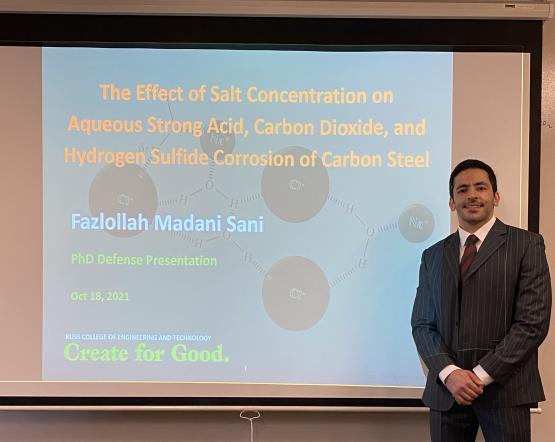The research at the Institute for Corrosion and Multiphase Technology continued during 2020 as three students transitioned to alumni. During the pandemic, Ph. D., Wei “Gianna” Zhang, Zheng Ma, and Fazlollah Madani Sani successfully defended their dissertations.
Zhang was first to complete, defending her dissertation on “Initiation and Propagation of Localized Corrosion of Mild Steel in Marginally Sour Environments;” her advisor was Associate Professor Marc Singer. Her groundbreaking work revealed that the root cause of pitting in marginally sour environments could be traced to the presence of minute concentrations of oxygen. As a result, she published three papers in Corrosion Science in 2021, including a pioneering study of mackinawite oxidation using in situ Raman spectroscopy. She also published a paper in Corrosion and presented at CORROSION conferences. Since defending, she has joined Schlumberger, working as a laboratory engineer in the corrosion group focusing on inhibitors and H2S scavengers.
Next to defend was Zheng Ma, also advised by Dr. Singer. Her dissertation work was on “Precipitation Kinetics of FeCO3 and FeS on Steel Substrate.” Her research was driven by the fact that precipitation of corrosion product layers, their characteristics, composition and kinetics, play a key role in governing corrosion behaviors. She probed this using a multi-pronged analytical approach involving electrochemical measurements, conducted in conjunction with utilizing a quartz crystal microbalance, as well as a variety of microscopic and spectroscopic techniques. Her work revealed that a better understanding of surface speciation was required, which led to development of a mechanistic model to predict uniform corrosion behavior of carbon steel in CO2 and H2SH2S environments based on water chemistry; this modified model showed that the surface speciation can be significantly different from bulk speciation with or without polarization. In addition to presenting five papers at annual CORROSION/AMMP conferences and placing in the Marcel Pourbaix Category for corrosion science at AMMP2021, she has published in Corrosion Science. Ma has decided to extend her time at ICMT and is currently engaged as a Post-Doctoral Researcher.
The most recent to defend of the trio was Fazlollah Madani Sani, working on “The Effect of Salt Concentration on Aqueous Strong Acid, Carbon Dioxide, and Hydrogen Sulfide Corrosion of Carbon Steel” and advised by Dr. Srdjan Nesic. His research culminated in the development of a corrosion rate prediction model valid for the H2O-NaCl-CO2-H2S system, which was designed to capture non-ideality. The corrosion rate prediction model could predict the experimental corrosion rates measured in this study with an average absolute accuracy of 13.5%. In addition to presenting at multiple CORROSION conferences, he has published in the Journal of The Electrochemical Society on “An Electrochemical Study of the Effect of High Salt Concentration on Uniform Corrosion of Carbon Steel in Aqueous CO2 Solutions.” He was recognized with the NACE Outstanding Student Award at CORROSION2020. Madani Sani has taken a position with OLI Systems working on water chemistry and corrosion modeling.

Congratulations to these Russ College of Engineering and Technology alumni!
